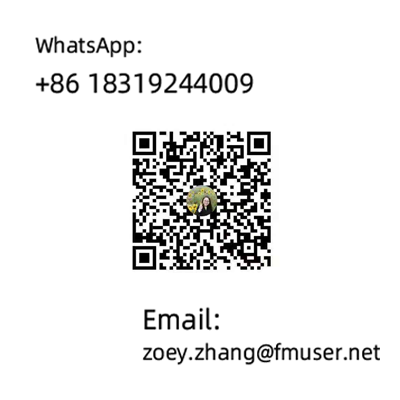Products Category
- FM Transmitter
- 0-50w 50w-1000w 2kw-10kw 10kw+
- TV Transmitter
- 0-50w 50-1kw 2kw-10kw
- FM Antenna
- TV Antenna
- Antenna Accessory
- Cable Connector Power Splitter Dummy Load
- RF Transistor
- Power Supply
- Audio Equipments
- DTV Front End Equipment
- Link System
- STL system Microwave Link system
- FM Radio
- Power Meter
- Other Products
- Special for Coronavirus
Products Tags
Fmuser Sites
- es.fmuser.net
- it.fmuser.net
- fr.fmuser.net
- de.fmuser.net
- af.fmuser.net ->Afrikaans
- sq.fmuser.net ->Albanian
- ar.fmuser.net ->Arabic
- hy.fmuser.net ->Armenian
- az.fmuser.net ->Azerbaijani
- eu.fmuser.net ->Basque
- be.fmuser.net ->Belarusian
- bg.fmuser.net ->Bulgarian
- ca.fmuser.net ->Catalan
- zh-CN.fmuser.net ->Chinese (Simplified)
- zh-TW.fmuser.net ->Chinese (Traditional)
- hr.fmuser.net ->Croatian
- cs.fmuser.net ->Czech
- da.fmuser.net ->Danish
- nl.fmuser.net ->Dutch
- et.fmuser.net ->Estonian
- tl.fmuser.net ->Filipino
- fi.fmuser.net ->Finnish
- fr.fmuser.net ->French
- gl.fmuser.net ->Galician
- ka.fmuser.net ->Georgian
- de.fmuser.net ->German
- el.fmuser.net ->Greek
- ht.fmuser.net ->Haitian Creole
- iw.fmuser.net ->Hebrew
- hi.fmuser.net ->Hindi
- hu.fmuser.net ->Hungarian
- is.fmuser.net ->Icelandic
- id.fmuser.net ->Indonesian
- ga.fmuser.net ->Irish
- it.fmuser.net ->Italian
- ja.fmuser.net ->Japanese
- ko.fmuser.net ->Korean
- lv.fmuser.net ->Latvian
- lt.fmuser.net ->Lithuanian
- mk.fmuser.net ->Macedonian
- ms.fmuser.net ->Malay
- mt.fmuser.net ->Maltese
- no.fmuser.net ->Norwegian
- fa.fmuser.net ->Persian
- pl.fmuser.net ->Polish
- pt.fmuser.net ->Portuguese
- ro.fmuser.net ->Romanian
- ru.fmuser.net ->Russian
- sr.fmuser.net ->Serbian
- sk.fmuser.net ->Slovak
- sl.fmuser.net ->Slovenian
- es.fmuser.net ->Spanish
- sw.fmuser.net ->Swahili
- sv.fmuser.net ->Swedish
- th.fmuser.net ->Thai
- tr.fmuser.net ->Turkish
- uk.fmuser.net ->Ukrainian
- ur.fmuser.net ->Urdu
- vi.fmuser.net ->Vietnamese
- cy.fmuser.net ->Welsh
- yi.fmuser.net ->Yiddish
Staying Safe When Using Public Wi-Fi Connections

The ability to connect to Wi-Fi in public areas is something many people expect and rely upon, especially when they are traveling away from home and need to get work done. However, there are several precautions you should take to make sure your data is as safe as possible when using Wi-Fi connections that are accessible to the public. Keep reading to learn about some precautions to take every time you tap into public Wi-Fi.
Some Internet hackers set up Wi-Fi connections that seem to be related to a public location, but really aren’t. For example, you may be sitting in a library and check the list of available Wi-Fi connections on your computer to see several options. If one is named “Public Library Internet Hub” and another is called “Public Library Wi-Fi,” you might just arbitrarily choose one. However, that could be risky.
To err on the side of caution, ask a representative from the place that’s offering the Wi-Fi to verify the name of the genuine connection. Otherwise, you may connect to something that’s not what it seems, and unknowingly give people access to your private information.
Some popular websites, such as Gmail and Facebook, use what’s known as two-factor authentication. This requires you to do something besides just entering your password in order to gain access to the sites, especially when you’re at an unfamiliar location. Examples include entering the characters from a specifically generated image or typing in your cell phone number.
That way, even if someone does get access to your password when you are on a public connection, the person still has to have knowledge of another piece of data before moving any further in the effort to hack your information.
Keep in mind that you may have to tweak your settings to enable two-factor authentication, but an increasing number of sites are able to recognize that you’re logging into somewhere unfamiliar, which is enough to trigger the tighter security.
It’s important to have specialty software on your computer that protects it from things like viruses and malware. However, that software can become nearly useless if you don’t keep it regularly updated against the latest threats.
Some people are likely to ignore warning messages that say a new software update is ready to be downloaded, but it’s a good idea to get those updates as soon as they’re released. Then, if your computer does get exposed to some kind of threat due to an insecure public Wi-Fi connection, you’ll more likely have the tools to combat it and avoid extensive problems.
Before going to any website that requires you to enter private data or access details you would not want other people to know, always look for the “https:” prefix in your browser’s address bar. Some browsers also include a lock symbol in the corner.
Both of those things indicate that data sent across the connection is encrypted, and therefore harder for hackers to crack into. Checking for that encryption is essential whenever you are working with private data, but especially when using public Wi-Fi.
When possible, avoid using public Wi-Fi to access websites with sensitive information, such as online banking portals or payment platforms. Use a private connection for those types of sites.
You may be in a situation where the majority of your time online is spent on a public Wi-Fi network. In that case, consider downloading a virtual private network (VPN) client. This will encrypt all the data you send, even if the site you’re actually visiting does not have an encryption feature. Your workplace may have a VPN client it expects employees to use, particularly if you travel a lot for business.
Some computers, and especially mobile devices, have a feature where the device automatically recognizes and connects to public Wi-Fi connections. In other cases, automatic connections can occur when you’re within range of a public Wi-Fi network you’ve used sometime in the past.
Change settings so your device will not store information about previously accessed public Wi-Fi hotspots in its memory, and make sure you always have to confirm that you want to connect to a specific hub. Otherwise, your data could be vulnerable, and you may risk unintentionally using device data when you don’t truly need to access the Internet.





